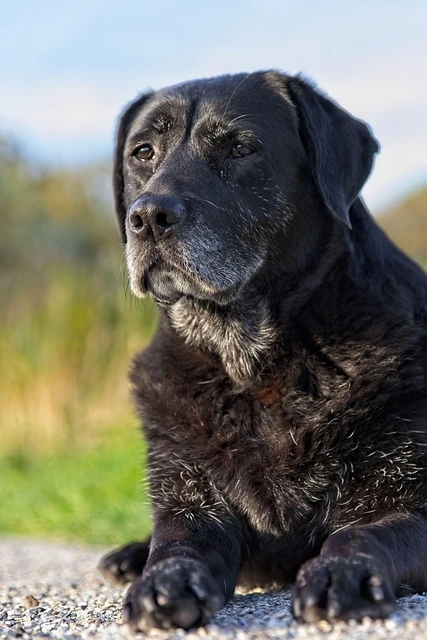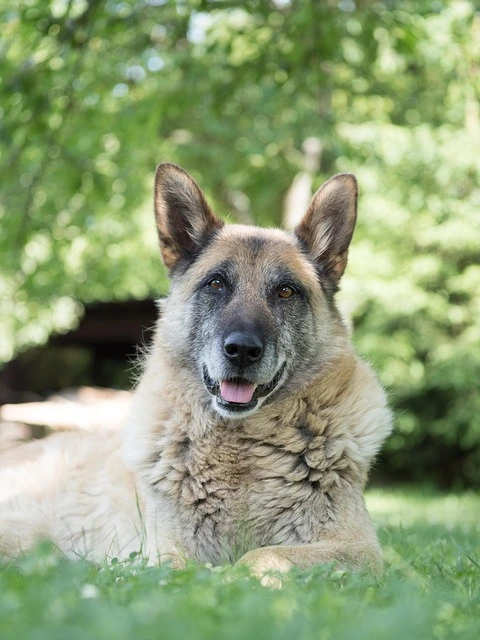
Table of Contents
Your dog’s sudden coughing can be alarming. Whether it’s a harsh hack, wet cough, or honking sound, you’re likely wondering why is my dog coughing and if it requires immediate attention.
Quick Answer
Dog coughing is often caused by minor irritants, kennel cough, allergies, or more serious conditions like heart disease or respiratory infections. Most mild, occasional coughs resolve on their own, but persistent, severe, or worsening coughs require veterinary attention, especially when accompanied by other symptoms like lethargy or breathing difficulties.
TL;DR: A dog’s occasional cough usually isn’t serious, but persistent coughing needs vet attention. Look for other symptoms like difficulty breathing, lethargy, or loss of appetite to gauge urgency.
Cough Sound Guide: Quick Reference
| Cough Sound | Likely Cause | First Step |
| Dry, hacking | Kennel cough, irritation | Rest, humidifier, monitor |
| Wet, productive | Infection, fluid in lungs | Vet visit within 24 hours |
| Gagging/retching | Object in throat, tonsillitis | Check mouth/throat, vet if persistent |
| “Goose honk” | Collapsed trachea (small breeds) | Switch to harness, reduce excitement |
| Wheezing cough | Asthma, bronchitis, allergies | Remove irritants, vet consultation |
| Soft, moist at night | Heart condition | Elevate head during sleep, prompt vet visit |
Why It Matters
Beyond the concerning sound, coughing serves an important purpose for your dog – it’s their body’s way of clearing irritants or blockages from the throat and airways. However, persistent coughing can indicate underlying health issues that may worsen without proper treatment. Chronic coughing can lead to:
- Inflammation and damage to the respiratory tract
- Reduced oxygen intake, affecting energy levels
- Disrupted sleep for both you and your pup
- Progression of potentially serious conditions like heart disease or pneumonia
Understanding why your dog is coughing is the first step to helping them breathe easier and preventing complications. While many causes are treatable at home, others require prompt medical intervention to prevent more serious health problems, according to the American Kennel Club.
Anatomy/Background
To understand why dogs cough, it helps to know a bit about their respiratory system. Dogs breathe through their nose or mouth, drawing air down the trachea (windpipe) and into their lungs. Along this pathway are several structures:
- Throat (Pharynx): Where the nasal passages and mouth meet
- Larynx: The “voice box” that protects the airway when swallowing
- Trachea: The main airway tube leading to the lungs
- Bronchi: Smaller airways that branch off into the lungs
A cough happens when receptors along this respiratory tract detect irritants or abnormalities. These receptors send signals to the brain, triggering the forceful expulsion of air – the cough reflex. This reflex aims to clear whatever is causing the irritation.
Different types of coughs can indicate different problems:
- Dry, hacking cough: Often indicates kennel cough or throat irritation
- Wet, productive cough: May signal fluid in the lungs or infection
- Gagging cough: Could be something stuck in the throat or tonsillitis
- “Goose-honk” cough: Typical of a collapsed trachea in small breeds
- Cough with wheezing: May indicate asthma or bronchitis
If your dog is also showing signs of nighttime respiratory distress, check our guide on why dogs pant at night for related symptoms. For dogs experiencing both coughing and digestive issues, our article on why dogs throw up yellow bile may provide additional insights on potential underlying causes.
Tools & Product Recommendations
Humidifier for Dry Air Relief
A good humidifier can make a world of difference for dogs with irritated airways or kennel cough. The LEVOIT Classic 300S Humidifier provides consistent moisture to ease breathing and soothe irritated throats. Perfect for keeping beside your dog’s bed during recovery from respiratory infections. It features a large tank for all-night operation and is whisper-quiet, so it won’t disturb your pup’s rest. The one drawback is that it requires regular cleaning to prevent mold growth. LEVOIT Classic 300S Humidifier.
Natural Throat Soother
For dogs with mild irritation or kennel cough, Zesty Paws Allergy & Immune Bites provide support for respiratory comfort. These chews contain ingredients like quercetin and colostrum that may help soothe throat irritation and provide immune system support. Ideal for dogs with seasonal sensitivities or those recovering from kennel cough. They’re chicken-flavored, so most dogs take them willingly. The limitation is they work better as general wellness support rather than immediate comfort for severe coughing. Zesty Paws Allergy & Immune Bites .
Air Purifier for Allergy Sufferers
The LEVOIT Air Purifier for Home is a game-changer for dogs with allergic cough or those sensitive to airborne irritants. With a HEPA filter that captures 99.97% of particles, it significantly reduces the allergens and irritants that can trigger coughing episodes. Best for households with dogs suffering from environmental allergies or homes in high-pollen areas. Its whisper-quiet sleep mode ensures it won’t disturb your dog while cleaning the air. The main limitation is that it only helps with airborne triggers, not other causes of coughing. LEVOIT Air Purifier for Home .
Elevated Dog Bed
For dogs with heart conditions that cause coughing, the Furhaven Pet – Therapeutic Ergonomic Luxe Lounger provides supportive comfort that helps ease breathing. The orthopedic foam helps older dogs rest comfortably while the slight elevation can assist dogs with heart-related coughing by reducing pressure on the chest. Great for senior dogs or those with known heart conditions. The plush covering is gentle on joints but may not be durable enough for aggressive chewers. Furhaven Pet – Therapeutic Ergonomic Luxe Lounger .
Step-by-Step Tutorial: Handling Your Dog’s Cough
- Assess the cough type. Listen carefully to determine if it’s dry, wet, gagging, honking, or wheezing. Record a video to show your vet if needed.
- Note accompanying symptoms. Check for fever, nasal discharge, lethargy, reduced appetite, or difficulty breathing, which help determine severity.
- Consider recent activities. Has your dog been at boarding, daycare, or dog parks recently? Exposure to other dogs increases kennel cough risk.
- Create a calm environment. Reduce excitement and provide a quiet, comfortable space as activity can trigger more coughing.
- Ensure proper hydration. Fresh water should always be available, as staying hydrated helps thin mucus and ease coughing.
- Use a humidifier. Place a cool-mist humidifier near your dog’s sleeping area to soothe irritated airways, especially at night.
- Temporarily switch to a harness. If your dog normally wears a collar, switch to a harness to reduce pressure on the trachea while coughing persists.
- Limit exposure to irritants. Avoid smoke, strong cleaning products, perfumes, and other potential airway irritants.
- Monitor and document. Keep a log of coughing frequency, duration, and any changes in intensity to share with your veterinarian.
- Contact your vet. If the cough persists beyond 2-3 days, worsens, or is accompanied by other concerning symptoms, seek professional care.
Infection vs. Allergy vs. Heart Issues: Quick Comparison
Infectious Cough (like Kennel Cough)
- Usually appears suddenly
- Often has a harsh, hacking sound
- May worsen after exercise or excitement
- Typically improves within 1-2 weeks
- Often follows exposure to other dogs
- Usually accompanied by normal energy levels
- May include mild clear nasal discharge
According to the American Kennel Club, kennel cough is highly contagious but typically resolves within 1-3 weeks in healthy adult dogs, though puppies and senior dogs may need more aggressive treatment.
Allergic/Environmental Cough
- Often seasonal or triggered by specific environments
- Frequently accompanied by itching, sneezing, or watery eyes
- Improves when trigger is removed
- May recur in similar situations or seasons
- Often sounds like throat-clearing or light hacking
- Energy and appetite typically normal
- May include clear nasal discharge
If your dog is showing other signs of allergies like constantly licking their paws, this could further suggest an allergic cause for their cough.
Heart-Related Cough
- Usually worse at night or when lying down
- Often a soft, moist-sounding cough
- Frequently accompanied by fatigue or exercise intolerance
- May include difficulty breathing or rapid breathing
- More common in older or overweight dogs
- Often worsens over time rather than improving
- May be accompanied by weight loss or reduced appetite
Breed Susceptibility Guide
Small Breeds (under 20 lbs)
- Yorkshire Terriers, Chihuahuas, Pomeranians: Highly susceptible to collapsed trachea (honking cough)
- Pugs, Boston Terriers, French Bulldogs: Prone to respiratory issues due to flat faces
- Toy Poodles, Maltese: Often affected by allergic bronchitis and chronic coughs
Medium Breeds (20-50 lbs)
- Cocker Spaniels, Beagles: Increased risk of heart valve issues that can cause coughing
- Bulldogs, Shar-Peis: Susceptible to respiratory infections due to facial structure
- Staffordshire Terriers: Somewhat prone to allergic reactions affecting the respiratory tract
Large Breeds (50-90 lbs)
- Labrador Retrievers, Golden Retrievers: Can develop laryngeal paralysis (hoarse cough) as they age
- German Shepherds: More susceptible to chronic bronchitis
- Boxers: Higher rates of heart conditions that can cause coughing
Giant Breeds (90+ lbs)
- Great Danes, Irish Wolfhounds: Prone to dilated cardiomyopathy leading to heart-related coughing
- Newfoundlands, Saint Bernards: Higher risk of heart enlargement causing respiratory compression
- Mastiffs: May develop heart conditions that lead to coughing as they age
Common Mistakes (and Fixes)
Ignoring a new cough. Even if your dog seems fine otherwise, new coughs should be monitored closely. The fix: Track duration, frequency, and any pattern to help your vet diagnose the cause.
Over-exercising a coughing dog. Activity can worsen coughing and delay healing. The fix: Provide limited, calm exercise until the cough resolves completely.
Using human cough medicine. Many human medications are toxic to dogs. The fix: Only use medications specifically prescribed by your veterinarian.
Exposing a coughing dog to other pets. If the cause is infectious, your dog could spread illness. The fix: Keep your coughing dog isolated from other pets until your vet confirms it’s not contagious.
Assuming kennel cough isn’t serious. While often mild, kennel cough can develop into pneumonia in puppies, seniors, or immunocompromised dogs. The fix: Have kennel cough evaluated, especially in vulnerable dogs.
Using a collar on a coughing dog. Collar pressure can irritate the trachea and worsen coughing. The fix: Switch to a harness until the cough resolves completely.
Missing the link to dental disease. Bacteria from dental infections can affect the respiratory system. The fix: Check for bad breath, drooling, or difficulty chewing that might indicate dental issues.
Troubleshooting (If/Then)
If your dog coughs mainly during or after exercise, then moderate activity levels and switch to a harness instead of a collar.
If the cough is worse at night or when lying down, then it may be heart-related; elevate your dog’s head slightly while sleeping and consult your vet promptly.
If your dog seems to cough after eating or drinking, then they might have a swallowing disorder; try elevated food bowls and slow-feeder dishes.
If the cough produces phlegm or sounds wet, then pneumonia could be developing; seek veterinary care immediately.
If the cough sounds like a goose honk, then a collapsed trachea is likely; avoid excitement and pulling on the leash, and consult your vet.
If your dog paws at their mouth while coughing, then check for a foreign object stuck in the mouth or throat.
If the cough started after changing environments, then consider allergies or irritants; try an air purifier and note if symptoms improve.
If your dog has a cough plus scoots their rear, then they might have parasites affecting both respiratory and digestive systems; schedule a parasite check with your vet.
Disclaimer: This article is for informational purposes only and is not intended to replace professional veterinary advice. Always consult with a qualified veterinarian for diagnosis and treatment of your pet’s medical conditions.
When to See a Professional
Seek immediate emergency care if your dog:
- Is having difficulty breathing or gasping for air
- Has blue-tinged gums (indicates oxygen deprivation)
- Is coughing up blood
- Collapses or faints associated with coughing
- Has severe, unrelenting coughing that prevents rest
Schedule a same-day vet appointment if your dog:
- Has a persistent cough lasting more than 2-3 days
- Shows lethargy or significant reduction in energy
- Refuses to eat or drink
- Has a fever (above 102.5°F)
- Has thick yellow or green nasal discharge
- Shows rapid breathing even when resting
- Experiences coughing fits that cause distress
FAQs
Can I catch my dog’s cough?
Most canine respiratory infections aren’t transmissible to humans. However, some conditions like certain parasites or fungal infections can potentially spread to people, especially those with compromised immune systems. Always wash hands after caring for a sick pet.
How can I tell if my dog’s cough is serious?
Most canine respiratory infections aren’t transmissible to humans. However, some conditions like certain parasites or fungal infections can potentially spread to people, especially those with compromised immune systems. Always wash hands after caring for a sick pet.
What’s the difference between a cough and reverse sneezing?
Reverse sneezing involves rapid inhalations through the nose with a snorting sound, while coughing is a forceful exhalation. Reverse sneezing episodes are typically brief and harmless, while persistent coughing often indicates an underlying issue.
Can anxiety cause my dog to cough?
Yes, stress and anxiety can trigger coughing in dogs, similar to how humans might clear their throats when nervous. However, anxiety-related coughing is a diagnosis of exclusion, meaning other causes should be ruled out first.
Are some dog breeds more likely to develop a cough?
Yes, brachycephalic (flat-faced) breeds like Pugs and Bulldogs are prone to respiratory issues, while small breeds like Yorkies and Pomeranians are susceptible to collapsed trachea. Larger breeds may develop heart-related coughs as they age.
How effective is the kennel cough vaccine?
The Bordetella vaccine reduces risk but doesn’t prevent all causes of kennel cough. It’s most effective against the Bordetella bronchiseptica bacteria but doesn’t protect against all the viruses that can cause respiratory infections. Annual vaccination is recommended for social dogs.
Can seasonal allergies make my dog cough?
Absolutely. Just like humans, dogs can develop allergic reactions to pollen, mold, and dust mites. These allergies can irritate the respiratory tract, leading to coughing, especially during high-pollen seasons or in dusty environments.
Should I be concerned if my dog coughs after drinking water?
Occasional coughing after drinking water might just mean your dog drank too quickly. However, consistent coughing after drinking could indicate a problem with the swallowing mechanism or an issue with the trachea. If this happens regularly, consult your veterinarian.
Can certain foods trigger coughing in dogs?
Some dogs may cough due to food sensitivities or allergies. Ingredients like chicken, beef, dairy, or wheat can cause inflammatory responses in sensitive dogs, which may manifest as coughing. An elimination diet under veterinary supervision can help identify food triggers.
Conclusion
A coughing dog can be concerning, but understanding the cause is the first step toward helping your furry friend. Remember that occasional, mild coughing might resolve on its own, but persistent or severe coughing always warrants professional attention. Monitor your dog’s symptoms carefully, provide a calm environment, ensure proper hydration, and avoid known irritants. When in doubt, consult your veterinarian – they’re your best partner in keeping your dog healthy and breathing comfortably. By acting promptly and appropriately when you notice your dog coughing, you’ll not only ease their discomfort but potentially prevent more serious health complications down the road. Your vigilance today means more happy walks, playtime, and cuddles tomorrow.

